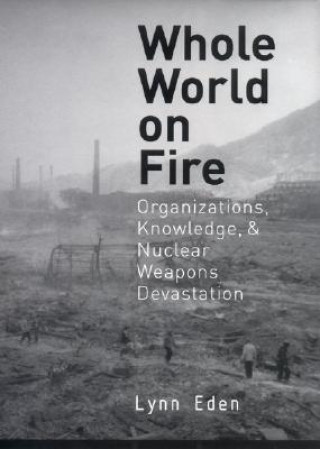
Dostawa
Doradca ds. zakupów
16 114 291 książek w 175 językach







Pokaż wszystkie języki (175)





Jednak się nie przyda? Nic nie szkodzi! U nas możesz zwrócić towar do 30 dni
 Bon prezentowy
O dowolnej wartości
Bon prezentowy
O dowolnej wartości
Bon prezentowy to zawsze dobry pomysł. Obdarowany może za bon prezentowy wybrać cokolwiek z naszej oferty.
Whole World on Fire
 Angielski
Angielski
 195 b
195 b
30 dni na zwrot towaru
Mogłoby Cię także zainteresować


"Whole World on Fire focuses on a technical riddle wrapped in an organizational mystery: How and why, for more than half a century, did the U.S. government fail to predict nuclear fire damage as it drew up plans to fight strategic nuclear war? U.S. bombing in World War II caused massive fire damage to Hiroshima and Nagasaki, but later war plans took account only of damage from blast; they completely ignored damage from atomic firestorms. Recently a small group of researchers has shown that for modern nuclear weapons the destructiveness and lethality of nuclear mass fire often--and predictably--greatly exceeds that of nuclear blast. This has major implications for defense policy: the U.S. government has underestimated the damage caused by nuclear weapons, Lynn Eden finds, and built far more warheads, and far more destructive warheads, than it needed for the Pentagon's war-planning purposes. How could this have happened? The answer lies in how organizations frame the problems they try to solve. In a narrative grounded in organization theory, science and technology studies, and primary historical sources (including declassified documents and interviews), Eden explains how the U.S. Air Force's doctrine of precision bombing led to the development of very good predictions of nuclear blast--a significant achievement--but for many years to no development of organizational knowledge about nuclear fire. Expert communities outside the military reinforced this disparity in organizational capability to predict blast damage but not fire damage. Yet some innovation occurred, and predictions of fire damage were nearly incorporated into nuclear war planning in the early 1990s. The author explains howsuch a dramatic change almost happened, and why it did not. "Whole World on Fire shows how well-funded and highly professional organizations, by focusing on what they do well and systematically excluding what they don't do well, may build a poor representation of the world--a
Informacje o książce
 Angielski
Angielski




 Jak kupować
Jak kupować















